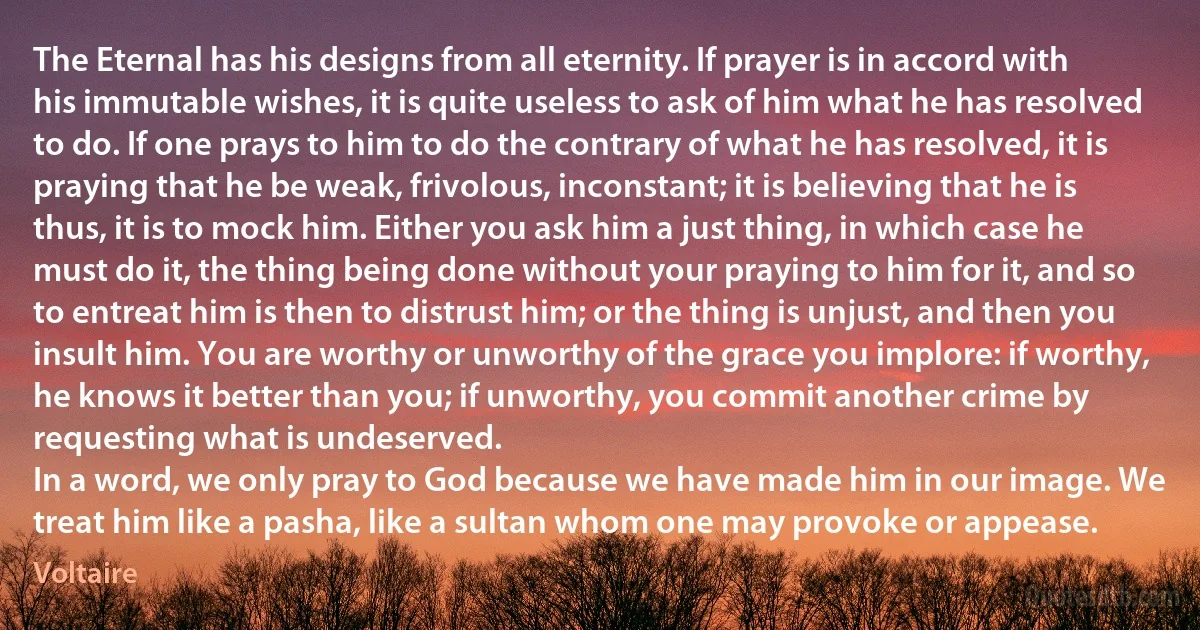
The Eternal has his designs from all eternity. If prayer is in accord with his immutable wishes, it is quite useless to ask of him what he has resolved to do. If one prays to him to do the contrary of what he has resolved, it is praying that he be weak, frivolous, inconstant; it is believing that he is thus, it is to mock him. Either you ask him a just thing, in which case he must do it, the thing being done without your praying to him for it, and so to entreat him is then to distrust him; or the thing is unjust, and then you insult him. You are worthy or unworthy of the grace you implore: if worthy, he knows it better than you; if unworthy, you commit another crime by requesting what is undeserved. In a word, we only pray to God because we have made him in our image. We treat him like a pasha, like a sultan whom one may provoke or appease.
VoltaireRelated topics
ask case commit crime done grace immutable implore insult praying prayer quite thing thus treat unworthy word worthyRelated quotes
Because I worked at the White House on 9/11, I carry the memories and the pain of that day in a wound that is particularly deep - one that is very personal. Some of you were not in government on 9/11, and some are from parts of the country where people do not think much today about terrorism. I appreciate that some may not share the same sense of sadness and anger. But I must ask you to take on the perspective that President Bush and I had on September 11th and the days following - the brutal unprovoked murders of mothers and fathers - sons and daughters...the phone calls of desperate good byes...symbols of American wealth and power in flames and ruins. Five years have passed. I concede it may be difficult for some to stay committed to this mission - maintaining the necessary intensity and commitment - without that perspective.

Alberto Gonzales
I see those pretended politicians who place all their subtlety, and who think they serve their country best, in circumventing those with whom they treat, interpreting the conditions of a treaty in such a manner, that all the advantage results to their own country. Far from blushing at conduct so contrary to equity, to right, and to national honesty, they boast of their dexterity, and pretend that they deserve the name of great negociators. How long shall public men boast of conduct which would disgrace a private individual? ...Shall powerful states abandon openly that which is honest, for that which may appear useful? It often happens for the happiness of the human race, that this pretended utility is fatal to the powers who follow it, and that, even among sovereigns, candour and right are found to be the safest policy.

Henry Temple, 3rd Viscount Palmerston
If Christ were to walk in this world today, do you know what would happen to Him? He would be placed in a mental institution and given psycho-therapy, just as would His Saints. The world would crucify Him today just as it did 2000 years ago, for the world has not learned a thing, except more devious forms of hypocrisy. And what would happen if, in one of my classes at the university, I would one day tell my students that all the learning of this world is of no importance beside the duty of worshipping God, accepting the God-man who died for our sins, and preparing for the life of the world to come? They would probably laugh at me, and the university officials, if they found out, would fire me-for it is against the law to preach the Truth in our universities. We say that we live in a Christian society, but we do not: we live in a society.

Seraphim Rose
WHAT HAPPENS AFTER DEATH?
When a human soul goes out of the body, some great mystery happens. For if it is guilty of sins, then there come hordes of demons, evil angels and dark forces, take that soul and drag it to their side.
No one should be surprised at that, because if a man surrendered and fell prey to them while still alive in this world, will not they have even greater control over him and enslave him when he departs from this world?
As for the other, the better part of people, something different happens to them. There are Angels around the holy servants of God in this life; the holy spirits surround them and protect them; and when their souls are separated from the body, the choir of Angels welcomes them into their fellowship, into a bright life, and thus leads them to the Lord.

Macarius of Egypt
It is just that, in so terrible a day, and in the last moments of my life, I should discover all the iniquity of falsehood, and make the truth triumph. I declare, then, in the face of heaven and earth, and acknowledge, though to my eternal shame, that I have committed the greatest crimes but it has been the acknowledging of those which have been so foully charged on the order. I attest - and truth obliges me to attest - that it is innocent! I made the contrary declaration only to suspend the excessive pains of torture, and to mollify those who made me endure them. I know the punishments which have been inflicted on all the knights who had the courage to revoke a similar confession; but the dreadful spectacle which is presented to me is not able to make me confirm one lie by another. The life offered me on such infamous terms I abandon without regret.

Jacques de Molay
